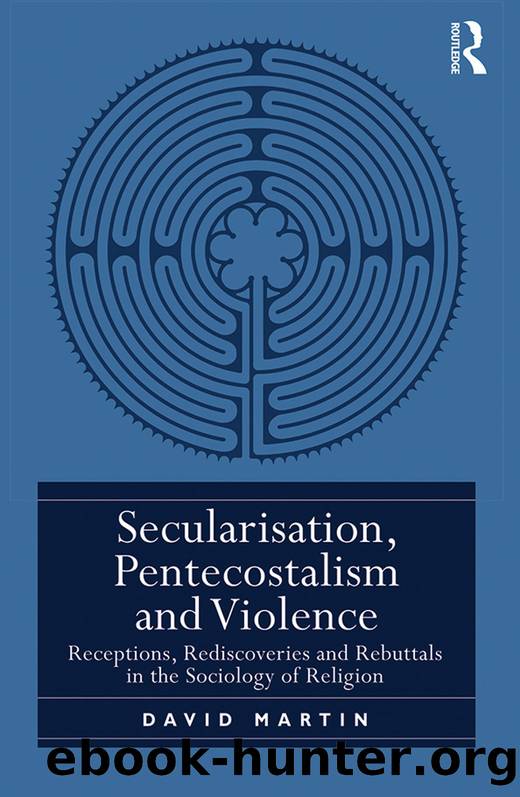Secularisation, Pentecostalism and Violence by Martin David;

Author:Martin, David;
Language: eng
Format: epub
Publisher: Taylor and Francis
Published: 2017-09-15T00:00:00+00:00
The example of Handelâs reception
So far I have attempted to sketch a theoretical framework based on the differing histories of secularisation in painting and music, and at the same time tried to relate these histories to very different national trajectories. The key contrast has been between the dramatic break evident in France and Russia compared to the relative continuity observable in Germany and Britain. I have focused in particular on a subjective hermeneutic deriving from Schleiermacher at the fountainhead of German Romanticism and suggested how that hermeneutic made so unlikely and surprising the return to the liturgical in so many of the major modernist composers. I now want to conclude by weaving into the complex skein of connections changes in the relative status of Handel, deployed as a key example of how processes of reception are built into the creation of âtheâ aesthetic canon and how these processes relate to nationalism and religion. I had originally intended to follow the equally dramatic changes in the status of Schubert, but to do that would be to introduce intolerable complications. The reception history of Handel is quite complicated enough and it involves many of the themes already discussed, such as nationalism and Evangelicalism.
Two things need stating at the outset. The first is that Handel was the first composer to be memorialised in his own lifetime with the Roubilliac statue in Vauxhall Gardens erected in 1738, and he was the first composer to be built into historiography in the writings of John Hawkins and Charles Burney immediately on his death in 1759.19 Ilias Chrissochoidis has pointed to just how massive his impact had to be for his death to initiate a revolution in historiography. Handel is the founder member of the musical canon and this canonical status is confirmed by his posthumous role in the concert life of England. The second important point relates to what Alfred Brendel has called the âmiraculousâ recovery of his reputation in recent years, so that, in Brendelâs estimation, he is equal in stature to Bach, and in vocal imagination to Mozart and Schubert (Brendel 2013, p. 8). The intellectual task is to understand the fluctuations over time and over cultural space, notably in Britain and Germany. Britain and Germany are appropriate foci of attention, given that the vast majority of the literature on Handel is either in German or English. At the same time one needs to take into account the rejection of Handel in France prior to the advent of the early music movement. Victor SchÅlcher, in his classic study of Handel, was one of the first to notice that Handel was not appreciated in France, just as French opera was not appreciated in Britain (Schoelcher 1857, 417â8).
Earlier in this discussion it was suggested that the motive power behind the choral movement in Britain was Evangelicalism, and that means that Evangelicalism was the motive power behind the apotheosis of Handel in the Victorian period. It is precisely this Evangelical motive power that the (late) doyen of
Download
This site does not store any files on its server. We only index and link to content provided by other sites. Please contact the content providers to delete copyright contents if any and email us, we'll remove relevant links or contents immediately.
| Africa | Americas |
| Arctic & Antarctica | Asia |
| Australia & Oceania | Europe |
| Middle East | Russia |
| United States | World |
| Ancient Civilizations | Military |
| Historical Study & Educational Resources |
The Dawn of Everything by David Graeber & David Wengrow(1568)
The Bomber Mafia by Malcolm Gladwell(1519)
Facing the Mountain by Daniel James Brown(1428)
Submerged Prehistory by Benjamin Jonathan; & Clive Bonsall & Catriona Pickard & Anders Fischer(1375)
Tip Top by Bill James(1291)
Wandering in Strange Lands by Morgan Jerkins(1281)
Evil Geniuses: The Unmaking of America: A Recent History by Kurt Andersen(1269)
Red Roulette : An Insider's Story of Wealth, Power, Corruption, and Vengeance in Today's China (9781982156176) by Shum Desmond(1267)
The Way of Fire and Ice: The Living Tradition of Norse Paganism by Ryan Smith(1259)
Driving While Brown: Sheriff Joe Arpaio Versus the Latino Resistance by Terry Greene Sterling & Jude Joffe-Block(1230)
American Kompromat by Craig Unger(1213)
F*cking History by The Captain(1196)
It Was All a Lie by Stuart Stevens;(1191)
American Dreams by Unknown(1153)
Treasure Islands: Tax Havens and the Men who Stole the World by Nicholas Shaxson(1152)
Evil Geniuses by Kurt Andersen(1143)
White House Inc. by Dan Alexander(1122)
The First Conspiracy by Brad Meltzer & Josh Mensch(1075)
The Fifteen Biggest Lies about the Economy: And Everything Else the Right Doesn't Want You to Know about Taxes, Jobs, and Corporate America by Joshua Holland(1030)
